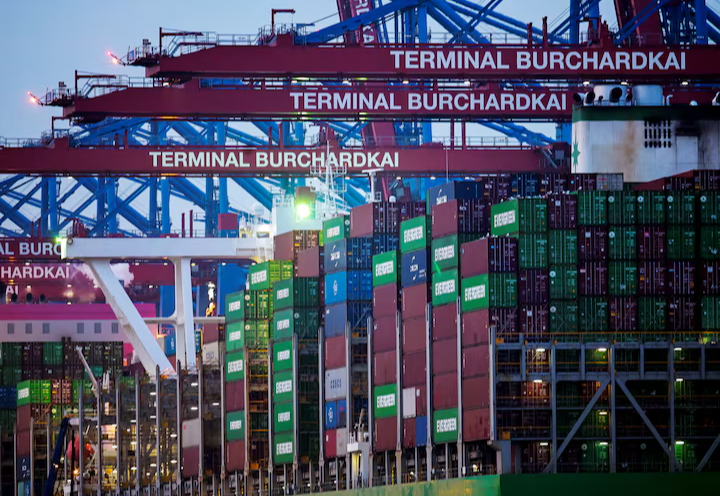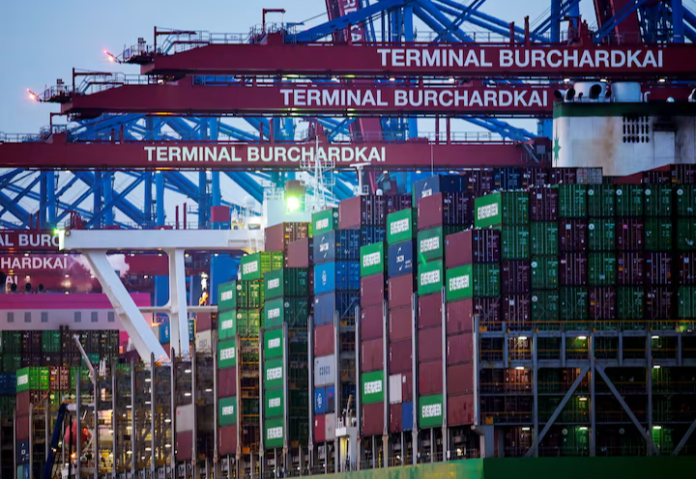Germany’s trade surplus with the United States has soared to a new all-time high, fueling concerns over potential U.S. tariffs that could escalate tensions between the two economic powerhouses. Recent data from Germany’s statistics office revealed that the surplus surged to €70 billion ($72 billion) in 2024, surpassing the previous record of €63.3 billion in 2023.
This increase comes at a time of heightened uncertainty, as the world waits to see how U.S. President Donald Trump will enforce new tariffs on imported goods. On Monday, Trump raised tariffs on steel and aluminum imports to 25%, a move that has sparked concerns in Germany and across the European Union.
Potential Economic Fallout of U.S. Tariffs
Germany’s Chancellor Olaf Scholz responded to the tariff announcement, emphasizing that while the EU awaits formal details, any aggressive U.S. trade measures would be met with retaliatory actions. Experts warn that escalating trade tensions could further weaken Germany’s already fragile economy, which has been struggling with back-to-back contractions.
Holger Goerg, an economist at the Kiel Institute for the World Economy (IfW), described the situation as having terrible timing. He warned that if Trump imposes additional tariffs on German exports, it could significantly impact Germany’s manufacturing sector, which heavily relies on the U.S. market.
The U.S. remains Germany’s largest trading partner, with exports dominated by automobiles and pharmaceuticals. In 2024, German exports to the U.S. grew by 2.2% year-on-year, reaching a record €161.3 billion, reinforcing America’s status as the leading buyer of German-made goods. However, imports from the U.S. declined by 3.4%, totaling €91.4 billion.
Why Trump’s Tariffs May Backfire
Trump has consistently criticized the U.S. trade deficit, arguing that imposing higher tariffs on imports will boost domestic manufacturing. However, analysts believe the real issue lies in the competitiveness of U.S. products on the global market, rather than foreign trade imbalances.
According to Goerg, the U.S. trade deficit reflects structural economic challenges, and tariffs won’t solve the problem. Instead, he argues that such measures could harm U.S. export performance, especially in industries where American companies excel, such as technology and services.

Interestingly, while Germany enjoys a surplus in goods trade, the situation is reversed in services, where the U.S. maintains a strong export surplus, including in its trade with Germany. This aspect, Goerg suggests, is something the Trump administration should carefully consider before escalating trade tensions further.
A Looming Trade War?
With Germany’s economy already under pressure, the potential for a full-blown trade conflict with the U.S. could further dampen growth. As the only G7 economy to have contracted for two consecutive years, Germany is in a vulnerable position, and any disruptions to its trade relationship with the U.S. could have severe consequences.
While the EU has yet to announce its official response, Chancellor Scholz’s firm stance suggests that Europe is prepared to retaliate if necessary. This raises the possibility of a prolonged trade standoff between two of the world’s largest economies, with potential ripple effects on global trade and financial markets.
As the situation unfolds, businesses and policymakers on both sides will need to carefully navigate these trade tensions, balancing economic interests while avoiding a full-scale trade war.



